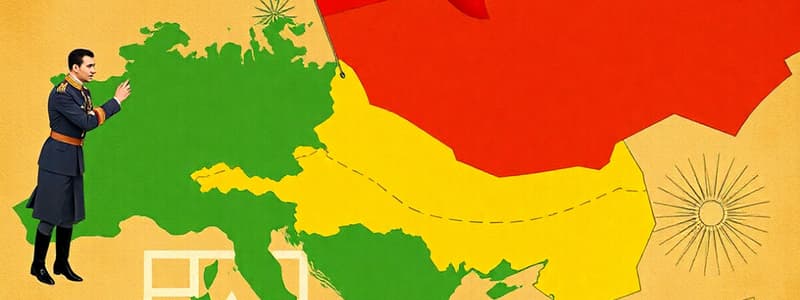Podcast
Questions and Answers
Ce rol a avut Petru cel Mare în modernizarea Imperiului Rus?
Ce rol a avut Petru cel Mare în modernizarea Imperiului Rus?
- A ignorat necesitatea de modernizare a armatei.
- A introdus reforme agricole fără siguranța alimentară.
- A promovat reformele europene pentru a spori puterea Rusiei. (correct)
- A concentrat puterea în mâinile țarilor fără reforme.
Care dintre aceste teritorii a fost inclus în expansiunea Imperiului Rus?
Care dintre aceste teritorii a fost inclus în expansiunea Imperiului Rus?
- Canada
- Polonia-Lituania (correct)
- Australia
- Irak
Care dintre următoarele a influențat declinul regimului țarist?
Care dintre următoarele a influențat declinul regimului țarist?
- Consolidarea totalitarismului
- Numărul crescut de războaie civile
- Conflictul cu Japonia (correct)
- Numirea mai multor ordine religioase
Ce provocări a adus cu sine expansiunea teritorială a Imperiului Rus?
Ce provocări a adus cu sine expansiunea teritorială a Imperiului Rus?
Ce factor a motivat expansiunea rusă spre obținerea porturilor calde?
Ce factor a motivat expansiunea rusă spre obținerea porturilor calde?
Flashcards
Imperiul Rus: Origine
Imperiul Rus: Origine
Imperiul Rus a apărut din Marele Ducat al Moscovei în secolul al XV-lea, prin extinderea teritorială și cuceriri.
Expansiune Teritorială: Motive
Expansiune Teritorială: Motive
Rusia s-a extins din motive strategice, economice și geopolitice, căutând resurse și ieșire la mări.
Transformarea Imperiului Rus în secolul al XIX-lea
Transformarea Imperiului Rus în secolul al XIX-lea
Imperiul Rus a suferit transformări semnificative, inclusiv industrializare, reforme sociale și participare crescută a diferitelor sectoare societale în viața politică.
Probleme ale Guvernării: Imperiul Rus
Probleme ale Guvernării: Imperiul Rus
Signup and view all the flashcards
Războaie Imperiale: Implicații
Războaie Imperiale: Implicații
Signup and view all the flashcards
Study Notes
Imperiul Rus - Istorie Politică
- The Russian Empire emerged from the Grand Duchy of Moscow in the 15th century.
- Early rulers consolidated power through territorial expansion and conquest, largely driven by the need for resources and security.
- The Tsardom of Russia gradually expanded its influence in Eastern Europe.
- Peter the Great (1682-1725) played a pivotal role in modernizing the Russian state and military, introducing western European reforms to propel Russia towards a more powerful position on the world stage.
- Catherine the Great (1762-1796) further expanded the empire, incorporating vast territories in the south and west.
- The Romanov dynasty ruled the Russian Empire until its collapse in 1917.
- Internal political struggles and oppositions to the autocratic rule played a role in shaping societal and political landscapes.
- The empire's vast size and diverse population often led to challenges in governance and administration.
- The decline of the Tsarist regime was influenced by a confluence of social unrest, economic problems, and military setbacks during the 19th and early 20th centuries.
- The Empire underwent significant transformations during the 19th century, including industrialization, social reforms, and increased participation from different sectors of society in political life.
Expansiune Teritorială
- The Russian Empire's expansion was driven by a combination of strategic, economic, and geopolitical factors.
- Pursuit of warm-water ports was a significant impetus for expansion, seeking access to the seas.
- The acquisition of resources like land, timber, and minerals fuelled territorial growth.
- The empire expanded into Siberia, Central Asia, and Poland-Lithuania, among others.
- The process of expansion involved conquest, treaties, and peaceful settlements with other societies.
- Territorial gains often impacted existing populations by moving people, changing borders, and imposing new policies.
- The expansionist policies sometimes led to conflicts with neighbouring empires, such as the Ottoman Empire.
- The diversity of ethnic, religious, and cultural groups within the acquired territories caused political and social tensions.
Războaiele Imperiale
- Russian involvement in various wars shaped the empire's borders, influence, and identity.
- The Russian Empire was engaged in numerous wars, ranging from local conflicts to large-scale continental conflicts.
- The Napoleonic Wars significantly impacted Russia's military and political trajectory.
- The Crimean War demonstrated the empire's military limitations and the need for modernization.
- The Russo-Japanese War (1904-1905) resulted in a significant blow to the Russian Empire's prestige and exposed weaknesses in its military.
- World War I marked a turning point for the empire, leading ultimately to its collapse.
- The empire was a major participant in European and global conflicts, shaping its international standing, diplomacy, and military strategy.
- Participation in these conflicts often involved significant human and financial cost for the state.
- The long-term effects of these wars extended to social, economic, and political developments within the Russian Empire.
Studying That Suits You
Use AI to generate personalized quizzes and flashcards to suit your learning preferences.




